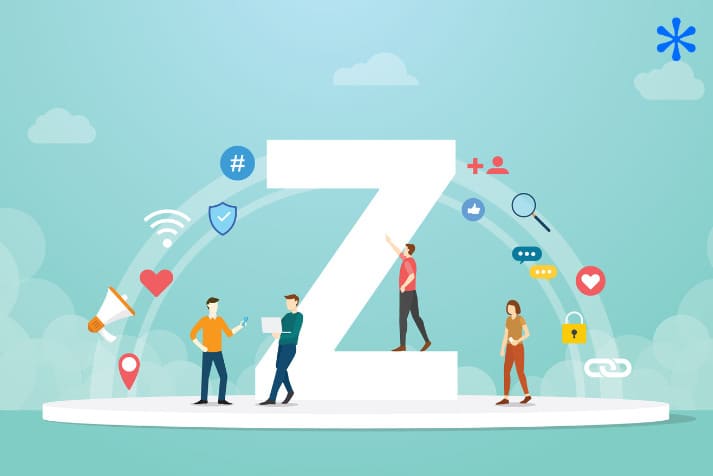Today, the professional world has become a melting pot of generations, each different from the next. Generations X, Y and Z working together is challenging for HR managers, as they must demonstrate extreme managerial agility. Even more so since generation Alpha will be arriving in barely ten years, with needs that will surely be very different from those of their predecessors. But upon closer inspection, it appears that some expectations are intergenerational and bring all employees together, regardless of age.
X, Y and Z: Generational Traits
Spanning more than 5 decades, generations X, Y and Z have grown up in very different socio-economic contexts, which has shaped their relationship with employment.
Generation X
Born between 1965 and 1980, Generation X is also called Baby Bust in reference to the decline in birth rate during this era. They followed the golden youth of the baby boomers and entered the job market after the stock market and oil crash of 1973, which ended full employment. From a professional point of view, respect for hierarchy is a given for this generation, who are perfectly happy with a vertical management system. They are independent and invested employees who are loyal to their companies, even if it means spending their entire career at the same one.
Generation Y
Generation Y has a host of other names: Millenials, Googlers, Digital Natives and even generation Why. They were born between 1980 and 2000. This is the first generation to have grown up with the Internet and globalisation. According to a 2017 Viva Technology study, employees of this generation want their jobs to provide satisfaction (28%) and personal development (26%). This is why they do not hesitate to change jobs or employers. They believe in working smarter in order to grow professionally.
Generation Z
Born after 2000, Gen Z is also nicknamed the thumb generation because of their nearly inherent connection to new technologies and smartphones. They arrived in a society that offers custom services and the instant gratification of the Internet. Their recent entry into the workforce was marked by Covid. Generation Z has disrupted the professional world, as these chronic scrollers are often less focused. They demand individual freedom and value-based employment.
What Have Past Generations Changed in the Professional World?
The professional world has evolved through the struggles of previous generations. They have been working hard for decades, as we can see through a few major changes appreciated by employees!
More humane work schedules
Part-time work and 5 or 6 weeks of paid leave have changed the lives of employees. Not to mention the reduction in working hours, which have dropped to 42 hours per week on average in Switzerland, according to the FSO. Add the 4-day week and unlimited leave that are becoming more and more popular, and we can bet that future generations will have even better working conditions.
The advent of workers’ rights
Workers’ rights provided protection for employees and gave them a voice in their working conditions. An achievement that has changed the relationship between employers and employees by promoting company dialogue.
More flexible management
Vertical management has gradually given way to caring and collaborative management. Some companies even use flat management, which gives employees more independence and allows them to participate in decision-making.
But Are There Intergenerational Values?
According to the FSO, in 2021, 35.9% of the Swiss job market was composed of Generation X, 35.2% of Millenials and 11.7% of Gen Z. This generational mix could lead one to believe that the arrival of younger Generation Z has changed the way people work. It would seem, however, that they share a certain number of core values with their elders:
Job Security
The top priority of Generation X is job stability, and for 68% of Millenials an open-ended contract remains a safe bet, according to the Viva Technology 2017 study. As for Gen Zers, only 8% of them are freelancers, as shown in a 2018 Monster YouGov study entitled Generation Z and the Professional World. This reluctance reflects their need for job security.
Flexible Scheduling
If there is one point on which generations X, Y and Z agree, it is the freedom provided by flexible scheduling. According to a Hays study, 44% of Generation X employees versus 41% of the other two generations make work/life balance a priority. These figures show how thin the divide is between the three generations.
Desire for Recognition
Like Generation X, Millenials are eager to see their investment valued through promotions and recognition. Gen Z is no exception, as revealed in a June 2022 study by Swibeco. Employees aged 17 to 25 are the most satisfied, just ahead of those aged 26 to 35, with the Swibeco benefits platform for rewarding employees.
Although the three generations have similar expectations, they prioritise these expectations differently. And therein lies the main difference between them.



